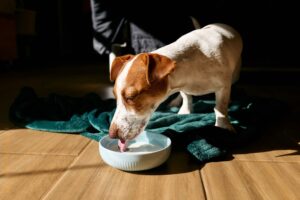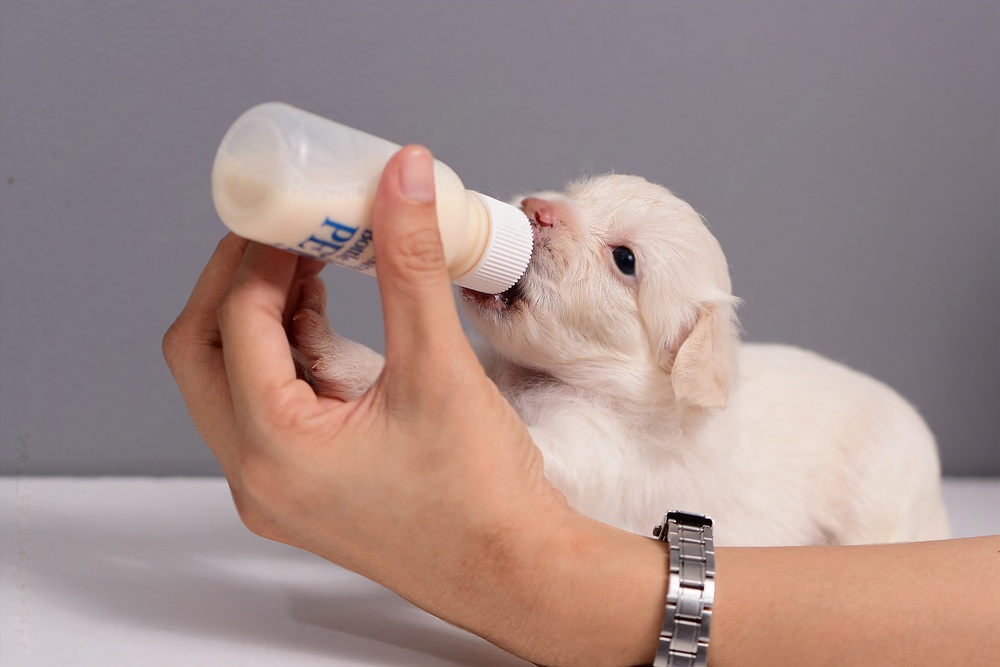Have you ever wondered if that innocent-looking bowl of milk could be causing chaos in your furry friend’s stomach? The age-old belief that milk is a treat for pups has been passed down through generations. But is this true?
After researching and making inquiries from qualified vets, we discovered that milk is composed of plenty nutrients which your dog may find hard to digest properly. And aside from this, most of these nutrients are non-beneficial to dogs.
So generally, milk is not directly toxic to dogs, but it contains lactose which your dog may not be able to digest properly. Before serving milk to your dog, it is important to test your dog for lactose intolerance first. This test should be carried out by a qualified vet.
In this blog post, we have revealed all you need to know about this common query “Does Milk Cause Diarrhea in Puppies?” We have also explained how to spot the symptoms of lactose intolerance in dogs and how to determine whether your dog is at risk or not.
Without further ado, let’s embark on this journey together!
Why is Milk Bad for Dogs?

There are numerous reasons why milks are considered a bad option for dogs, some of them include:
Lactose Intolerance
Dogs, just like certain humans, often lack the enzyme lactase required for breaking down lactose, the sugar present in milk. When dogs with lactose intolerance ingest milk, the undigested lactose can lead to digestive disturbances.
This deficiency manifests as bloating, gas, and diarrhea. Observing these signs is crucial, as they signify potential discomfort for your pet. Therefore, pet owners need to be aware of their dog’s digestive capacity and refrain from introducing lactose-rich milk into their diet.
Stomach Upset
Canine digestive systems are sensitive, and introducing milk can disrupt the delicate balance, causing stomach upset. The richness of milk can be overwhelming for a dog’s stomach, potentially leading to nausea and vomiting.
Unwanted Calories
While milk is a source of calories, excessive consumption may contribute to weight gain in dogs. To keep your dog healthy, it is important to help them maintain an optimal weight.
Regularly offering milk as a treat to your dogs can inadvertently introduce surplus calories into their diet, which may further lead to obesity, high blood pressure, arthritis, etc.
To ensure a balanced nutritional intake, it’s advisable to opt for dog-specific treats designed to meet their dietary requirements without compromising their weight management.
Nutrient Imbalance
While milk offers certain nutrients, incorporating it into a dog’s diet without consideration of their overall nutritional requirements may upset the balance.
A well-rounded canine diet demands precise proportions of essential nutrients. Relying solely on milk could potentially disrupt this balance.
Potential Allergies
Dogs, like humans, can develop allergies to specific proteins present in milk. These allergies may manifest as itching, skin irritations, or gastrointestinal issues.
To prevent this from happening, it is important to provide your dog with only a diet tailored to their specific needs.
Can Puppies Drink Store-Bought Milk?
Milk is a natural food for humans, and dogs can drink it, too. However, dogs should not be given large quantities, since milk contains lactose. Depending on the digestive system, milk can be toxic for a dog, while a small amount of milk can be safe.
It is always a good idea to consult your veterinarian before introducing new foods to your dog. It is safe to give your puppy a small amount of milk if they do not have a dairy allergy.
Although goat’s milk has many benefits for dogs, it can irritate their digestive system. There are many plant-based milk alternatives, including almond milk, which contains no lactose.
If your dog cannot tolerate dairy products, try giving them yogurt popsicles instead. These treats are fun for both dogs and humans! And while the question of whether dogs can drink store-bought milk remains controversial, many experts believe it’s safe for your dog.
While it’s true that puppies can consume store-bought milk, it’s important to avoid giving your puppy too much milk. The fat content in this product can cause problems, including pancreatitis and obesity.
But it’s also true that dogs can tolerate small amounts of milk, though they don’t drink large amounts of it.
But this is not a good idea if your puppy is under three weeks old – lactose intolerant dogs often suffer from health problems and can’t digest milk.
Symptoms of Lactose Intolerance in Dogs

Dogs exhibit certain symptoms when they are unable to digest lactose effectively, below are some of the symptoms of lactose intolerance in dogs:
- Digestive Distress: Look out for signs like bloating, gas and diarrhea.
- Abdominal discomfort
- Vomiting
- Frequent bowel movement
- Lethargy
These symptoms above are pointers to lactose intolerance in dogs. After feeding your dog with milk or any dairy product, it is important to be vigilant and check for these symptoms. If you notice any of these signs, consult with your vet for proper medication and treatment.
A veterinarian will check your dog for signs of lactose intolerance by examining it. He may also take a blood sample and poop samples to rule out other health problems and to determine if your dog has lactose intolerance.
Once a veterinarian has determined that your dog suffers from lactose intolerance, he or she may recommend a course of treatment.
Some people recommend avoiding dairy products altogether. However, dogs can tolerate goat milk and ice cream in small amounts. Adding goat milk to your dog’s diet may be a good option for those with lactose intolerance. In addition, ice cream and milkshakes are safe for some dogs.
Just make sure to check the ingredients, as they may contain artificial sweeteners and sugar that can be harmful to your dog.
Before you go, you may also read: Can Dogs Eat Soursop?







Leave a comment